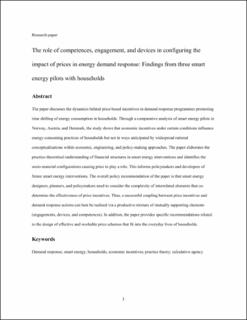| dc.contributor.author | Haunstrup Christensen, Toke | |
| dc.contributor.author | Friis, Freja | |
| dc.contributor.author | Bettin, Steffen | |
| dc.contributor.author | Throndsen, William | |
| dc.contributor.author | Michael, Ornetzeder | |
| dc.contributor.author | Skjølsvold, Tomas Moe | |
| dc.contributor.author | Ryghaug, Marianne | |
| dc.date.accessioned | 2020-08-24T08:28:42Z | |
| dc.date.available | 2020-08-24T08:28:42Z | |
| dc.date.created | 2019-12-10T11:21:25Z | |
| dc.date.issued | 2019 | |
| dc.identifier.issn | 0301-4215 | |
| dc.identifier.uri | https://hdl.handle.net/11250/2673517 | |
| dc.description.abstract | The paper discusses the dynamics behind price-based incentives in demand response programmes promoting time shifting of energy consumption in households. Through a comparative analysis of smart energy pilots in Norway, Austria, and Denmark, the study shows that economic incentives under certain conditions influence energy-consuming practices of households but not in ways anticipated by widespread rational conceptualisations within economic, engineering, and policy-making approaches. The paper elaborates the practice-theoretical understanding of financial structures in smart energy interventions and identifies the socio-material configurations causing price to play a role. This informs policymakers and developers of future smart energy interventions. The overall policy recommendation of the paper is that smart energy designers, planners, and policymakers need to consider the complexity of interrelated elements that co-determine the effectiveness of price incentives. Thus, a successful coupling between price incentives and demand response actions can best be realised via a productive mixture of mutually supporting elements (engagements, devices, and competences). In addition, the paper provides specific recommendations related to the design of effective and workable price schemes that fit into the everyday lives of households. | en_US |
| dc.language.iso | eng | en_US |
| dc.publisher | Elsevier | en_US |
| dc.title | The role of competences, engagement, and devices in configuring the impact of prices in energy demand response: Findings from three smart energy pilots with households | en_US |
| dc.type | Journal article | en_US |
| dc.description.version | submittedVersion | en_US |
| dc.source.journal | Energy Policy | en_US |
| dc.identifier.doi | https://doi.org/10.1016/j.enpol.2019.111142 | |
| dc.identifier.cristin | 1758750 | |
| dc.relation.project | Norges forskningsråd: 259822 | en_US |
| dc.description.localcode | © 2019. This is the authors' manuscript to the article. | en_US |
| cristin.unitcode | 194,62,40,0 | |
| cristin.unitname | Institutt for tverrfaglige kulturstudier | |
| cristin.ispublished | true | |
| cristin.fulltext | preprint | |
| cristin.qualitycode | 1 | |
